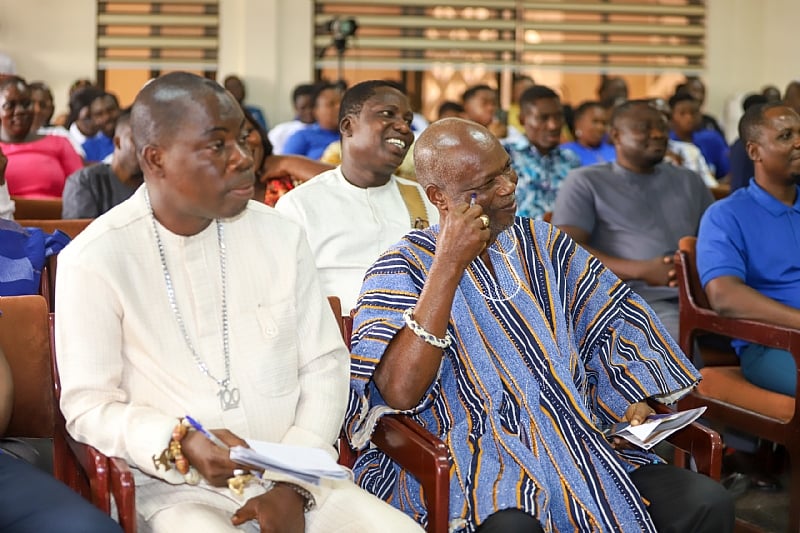Dr. Emmanuel Mensaklo, an economics education lecturer at the University of Education, Winneba, has emphasized the urgent need for Ghana to integrate artificial intelligence (AI), data science, and digital literacy into its educational curricula and economic blueprints. He stressed that nations failing to embrace these technological advancements risk being left behind in the rapidly evolving global landscape. Dr. Mensaklo delivered this message during a lecture at Abor Senior High School’s 60th-anniversary celebration, a landmark event themed “60 Years of Impactful Journey: Providing Transformative Secondary Education Through Indigenous Values and 21st Century Skills.” He advocated for a systematic and sustained implementation of these crucial skills within the education system, drawing attention to the importance of learning from past unsuccessful initiatives to avoid repeating similar mistakes. The lecturer highlighted the vital connection between Ghana’s progress and the development of well-rounded citizens equipped with both traditional values and modern educational aspirations.
Focusing on “The Role of 21st-century Skills in Providing Transformative Secondary Education in Ghana,” Dr. Mensaklo underscored the significance of incorporating these skills into the nation’s educational framework. He explained that these skills, including critical thinking, creativity, collaboration, and communication, are essential for students to navigate and succeed in an increasingly AI-driven world characterized by rapid technological change. These competencies are crucial not only for academic success but also for personal and professional growth, equipping students with the adaptability and problem-solving abilities required in the modern workforce. However, he cautioned against prioritizing technical skills at the expense of human values. He emphasized that technical prowess without a foundation in empathy, kindness, and moral courage is not only insufficient but potentially detrimental.
Professor Edem Kwasi Bakah, a lecturer at the University of Cape Coast’s Department of French, addressed “The Role of Indigenous Values in Transformative Secondary Education.” He argued that while indigenous values form the core of any society, many communities are experiencing a gradual erosion of these essential principles. He pointed to five key stakeholders as bearing responsibility for this decline: families, schools, chieftaincy institutions and communities, religious institutions, and the pervasive influence of new media, particularly social media. He urged these stakeholders to acknowledge their roles and actively work towards re-instilling these values in the younger generation. Professor Bakah linked the success of the government’s reset agenda to a robust promotion of indigenous values across all aspects of Ghanaian life.
Professor Bakah commended the government’s School Farm Initiative launched in 2025, emphasizing its potential not only as a means of providing food for students but also as a valuable platform for teaching essential life skills. He urged the government to leverage this initiative to instill values such as patience, hard work, perseverance, problem-solving, teamwork, collaboration, a strong work ethic, physical and mental resilience, and calculated risk-taking. These values, he argued, are essential for personal growth and societal development, complementing the academic skills acquired in the classroom.
The headmaster of Abor Senior High School, Reverend Dr. Seth Gocky Agbeyome, appealed for support in several key areas, including infrastructure development, mentorship programs, and financial donations. These resources, he explained, are vital to further elevate the school’s educational standards and enable it to effectively fulfill its mission of producing well-rounded, competent, and morally grounded citizens. This approach aims to harmonize traditional values with modern educational aspirations, preparing students to contribute meaningfully to society. The 60th-anniversary celebration served as a testament to the school’s longstanding dedication to nurturing future leaders and contributing to national development, reflecting its commitment to providing quality education.
The event was presided over by Professor Paul Nyagorme, Director of Research and Admission at the University of Cape Coast’s Accra Campus, representing fellow alumnus Mr. Bernard Ahiafor, the 1st Deputy Speaker of Parliament. The celebration was also graced by the presence of several other dignitaries, including Lawyer Nelson Kporxa, the school’s Board Chairman; Fiator Anthony Yao Jim-Fugar, former Board Chairman; Torgbui Awusu III, Chief of Afife; Dr. Godwin Kofi Vondolia, lecturer at UCC; Dr. Ishmael Hlovor, lecturer at UEW; Dr. Noble Gati; Mr. Raphael Edem Yawlui, Assosa National President; and Mr. William Avemegah, a former teacher at the school. The event also saw strong representation from alumni, current staff, and students, demonstrating the school’s enduring impact on the community and the nation. The gathering served as a platform to reflect on the school’s achievements and to reaffirm its commitment to providing transformative education for future generations.


